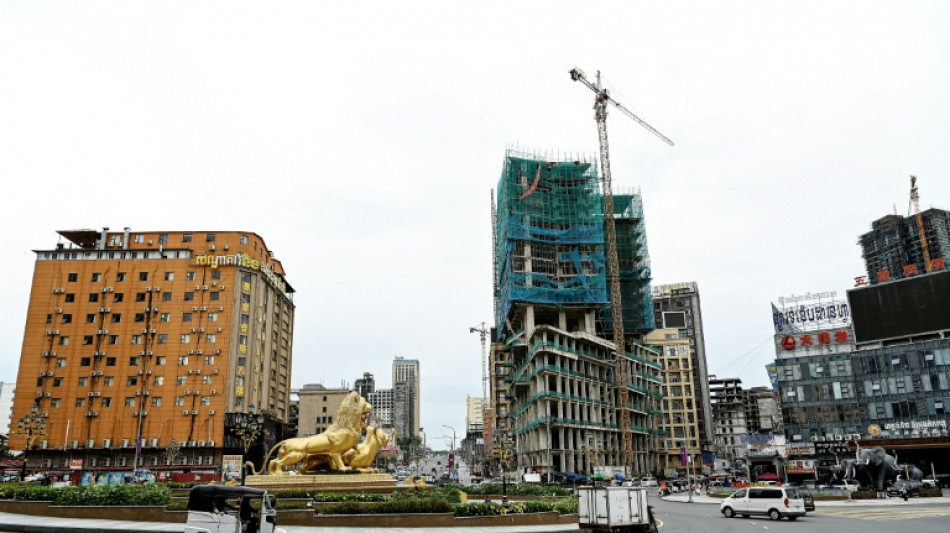

'Mass scale' abuses in Cambodia scam centres: Amnesty
While looking for jobs on Facebook, Jett thought he had found a well-paying opportunity working in online customer service in his home country of Thailand.
Following instructions to travel across the kingdom, the 18-year-old ended up being trafficked across the border to a compound in Svay Rieng, Cambodia.
There Jett was beaten, tortured and forced to perpetrate cyberscams, part of a multibillion-dollar illicit industry that has defrauded victims around the world.
He was forcibly held at the compound for seven months, during which "there was no monetary compensation, and contacting family for help was not an option", he told AFP.
"Will I survive, or will I die?" Jett (a pseudonym to protect his identity) recalled asking himself.
Abuses in Cambodia's scam centres are happening on a "mass scale", a report published Thursday by Amnesty International said, accusing the Cambodian government of being "acquiescent" and "complicit" in the exploitation of thousands of workers.
The report says there are at least 53 scam compounds in Cambodia, clustered mostly around border areas, in which organised criminal groups carry out human trafficking, forced labour, child labour, torture, deprivation of liberty and slavery.
Amnesty's Montse Ferrer said that despite law enforcement raids on some scam compounds, the number of compounds in Cambodia has increased, "growing and building" in the last few months and years.
"Scamming compounds are allowed to thrive and flourish by the Cambodian government," she told AFP.
The Cambodian government has denied the allegations.
Jett was made to romance his wealthy, middle-aged compatriots on social media, gaining their trust until they could be tricked into investing in a fake business.
"If the target fell into the trap, they would be lured to keep investing more until they were financially drained -- selling their land, cars, or all their assets," he said.
Scam bosses demanded exorbitant targets of one million baht ($31,000) per month from overworked employees –- a target only about two percent of them reached, he said.
"Initially, new recruits wouldn't face physical harm, but later, reprimands escalated to beatings, electric shocks, and severe intimidation," Jett told AFP.
- 'Woefully ineffective' –
The other employees in his multi-storey building were mostly Chinese, with some Vietnamese and some Thais.
Amnesty International says none of the ex-scammers of the 58 they interviewed for the report were Cambodian, and "overwhelmingly" were not paid for their labour.
Most of the scam centre bosses were Chinese, Jett said, adding that they used Thai interpreters when meting out punishments to those who performed poorly.
"Sometimes they'd hold meetings to decide who would be eliminated tomorrow," he said. "Or who will be sold (to another scam compound)? Or did anyone do something wrong that day? Did they break the company rules?"
He claims a colleague falsely accused him of wrongdoing to the Chinese bosses for a bounty. He pleaded his innocence but they "just didn't listen".
Ferrer said Cambodian government interventions against the scam centres had been "woefully ineffective", often linked to corruption by individual police officers at a "systemic and widespread level".
Government spokesman Pen Bona told AFP: "Cambodia is a victimised country used by criminals to commit online scams. We do recognise that there is such thing, but Cambodia has taken serious measures against the problem."
The UN Office on Drugs and Crime said in April that the scam industry was expanding outside hotspots in Southeast Asia, with criminal gangs building up operations as far as South America, Africa, the Middle East, Europe and some Pacific islands.
In Cambodia, Jett ultimately staged a dramatic escape after a particularly severe beating in which his arm was broken. He jumped out of a building, passed out and later woke up in hospital.
"Whether I died or survived, both options seemed good to me at the time," he said. "Consider it a blessing that I jumped."
He is now seeking legal recourse with assistance from Thai government agencies who have categorised him as a victim of human trafficking.
But Ferrer said effective action to help end the industry must come from the Cambodian government.
"We are convinced that if the Cambodian government wanted to put a stop they would be able to put a stop. At the very least they would be able to do much more than what we're seeing," she said.
E.Cárdenas--ECdLR






